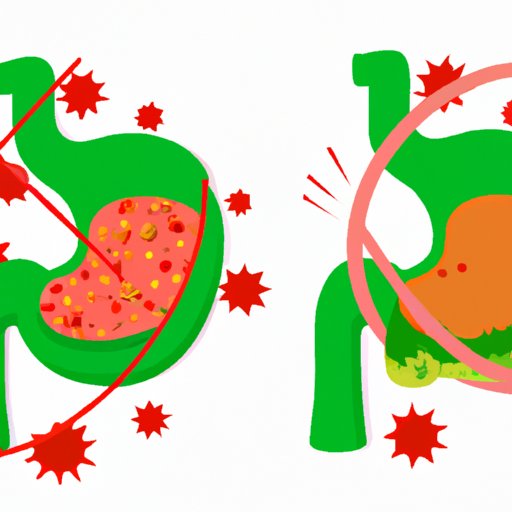
Introduction
Stomach flu, also known as viral gastroenteritis, is a highly contagious illness caused by various viruses. It is a common illness that affects millions of people worldwide, causing symptoms like diarrhea, vomiting, stomach cramps, and fever. Knowing how long the contagious period of stomach flu lasts is important in preventing the spread of the virus from infected individuals to others.
In this article, we will comprehensively delve into how long you are contagious with the stomach flu. We will explore the science behind stomach flu contagiousness, how long the contagious period lasts, and tips on how to avoid catching or spreading the virus.
The Science Behind Stomach Flu Contagiousness: A Comprehensive Guide
Stomach flu is caused by various viruses, including norovirus, rotavirus, adenovirus, and astrovirus. The virus enters the body through the mouth and attacks the lining of the stomach and intestines.
The virus then multiplies rapidly, leading to inflammation of the digestive system, which results in symptoms like diarrhea, vomiting, fever, and stomach cramps.
The virus can be transmitted through contaminated food or water, close contact with an infected person, or touching surfaces contaminated with the virus and then touching one’s mouth or nose.
When a person is infected with stomach flu, the immune system quickly responds by producing antibodies to fight the virus. The immune response can help the infected person recover from the illness.

Breaking Down the Contagious Period of Stomach Flu: Everything You Need to Know
The contagious period of stomach flu refers to the duration during which the infected person can spread the virus to others. The contagious period generally starts from the time the infected person starts experiencing symptoms like diarrhea and vomiting until up to three days after the symptoms have subsided.
It is important to note that some people, especially those with weak immune systems, may remain contagious for an extended period, up to two weeks or more after the symptoms have subsided.
During the contagious period, the virus can be spread through contact with fecal matter or vomit from infected persons, sharing utensils, and surfaces contaminated with the virus.
Understanding the Duration of Stomach Flu Contagiousness: Key Facts and Figures
Stomach flu typically lasts between one to three days, with symptoms ranging from mild to severe. However, some infected people may take up to ten days to recover completely.
The duration of contagiousness varies from one individual to another. Some people may remain contagious for up to three days after the symptoms have subsided while others may be contagious for up to two weeks or more.
There are various factors that may contribute to long-lasting contagiousness, including weak immune systems, age, and underlying health conditions.
Stomach Flu Contagiousness Explained: How Long is Too Long?
After the contagious period is over, infected individuals can no longer spread the virus to others. Generally, a person with stomach flu is considered contagious until three days after the last episode of diarrhea or vomiting.
However, some people may take longer to stop shedding the virus and may remain contagious for an extended period, up to two weeks or more.
It is crucial for infected individuals to stay home from work or school until the contagious period is over to avoid infecting others. Additionally, infected individuals should practice good hygiene by washing their hands thoroughly with soap and water frequently during the illness and after the symptoms have subsided.
The Contagiousness of Stomach Flu: What You Need to Tell Your Friends and Family
It is important to inform friends and family members about your illness to avoid spreading the virus to them. You should explain that you are contagious and that they should take preventive measures to avoid contracting the virus.
To prevent the spread of the virus, the infected person should not share utensils, towels, or personal items with others. Family members or roommates should use a separate bathroom if available, and shared surfaces should be disinfected regularly.
Stomach Flu and Contagiousness: Tips to Avoid Catching and Spreading the Virus
The best way to prevent catching the stomach flu is by practicing good hygiene. Wash your hands frequently with soap and water and avoid close contact with infected individuals.
You should also be cautious when handling food and avoid eating contaminated food or drinking contaminated water. If you have to care for an infected family member or friend, wear gloves, and avoid direct contact with their vomit or stool.
To prevent the spread of the virus, it is important to sanitize your surroundings by cleaning and disinfecting surfaces that may have come into contact with the virus. Use a bleach solution to disinfect contaminated surfaces like toilets, sinks, and countertops.
From Beginning to End: The Contagious Period of Stomach Flu and What You Can Do to Stay Healthy
In conclusion, stomach flu is a highly contagious illness caused by various viruses that affect the digestive system. The contagious period of stomach flu refers to the duration an infected person can spread the virus to others.
It is important to adhere to good hygiene practices and avoid close contact with infected individuals to prevent contracting the virus. If you are infected, inform your friends and family about your illness, and take preventive measures to avoid spreading the virus.
In the end, it is vital to stay home from work or school until the contagious period is over to protect others and facilitate a quick recovery.
Conclusion
Knowing how long you are contagious with the stomach flu is important in preventing the spread of the virus from infected individuals to others. We have comprehensively explored the science behind stomach flu contagiousness, the contagious period, and tips on how to avoid catching or spreading the virus.
Overall, understanding the contagious period of stomach flu is crucial in preventing the spread of the virus and maintaining good health.





